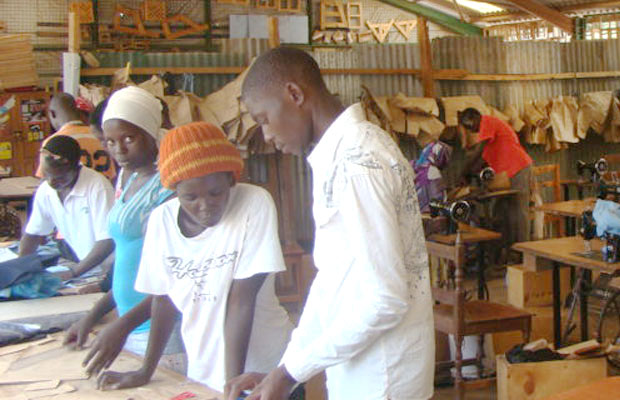
Brighter Futures at Kakuma Refugee Camp
After witnessing her family’s brutal murder by militants, young Soieso fled the Democratic Republic of Congo and never looked back. Now living at the Kakuma Refugee Camp in Kenya, she is learning a trade that will help rebuild her life and her country, thanks to Salesian missionaries.
Since 1993, when UNHCR (United Nations High Commissioner for Refugees) first invited Salesian missionaries from Don Bosco Korr to establish a presence at Kakuma, they have provided material, spiritual and educational support for thousands of refugees from Ethiopia, Eritrea, Somalia, South Sudan, Uganda, Burundi, Rwanda and the Democratic Republic of Congo. Some, like Soieso, have escaped war and violence; others seek relief from drought, famine or the misery of poverty. All arrive hoping one day to return home, yet fearing they may never be able to.
“As the only humanitarian organization with permanent residence inside the camp, our missionaries are committed to helping refugees — who have grown near and dear to their hearts as parishioners and friends — prepare for brighter futures in their countries of origin, or wherever they ultimately settle,” says Father Mark Hyde, director of Salesian Missions. “We want them to leave Kakuma with the employment and life skills they need to live independently, and to meaningfully contribute to society.”
In addition to safety, security and vital services such as housing, healthcare, clean water and sanitation, missionaries run eight outreach centers, four technical training schools, literacy and math courses, agricultural training and a Catholic church. To date, Salesian-run programs have successfully trained thousands of youth like Soieso in viable trades to help them earn a living and support their families. Many have learned skills like welding, plumbing, carpentry and bricklaying, which they have been able to apply within the camp itself — building critical infrastructure for its growing population.
“We are arming ourselves with skills, which we will use to rebuild our countries when we go back home,” Soieso says, in an Anadolu Agency article that first reported her story. “When I came here, I was a student. I used to speak only French — not even a single word of English. Now I will leave this place a professional designer. I design clothes, make my own patterns, and I am sure that … I will bring change [when I return to the Democratic Republic of Congo],” she says.
UNHCR officials agree. “The capacity-building that comes with vocational training will help [refugees] to be economically inclusive,” says Danya Kattan, a livelihood officer for Kakuma residents. “[The training] will get them to work, not only here, but also when they head back home … and participate in the reconstruction of their countries.”
Our mission teaches valuable skills that bring new hope to displaced persons around the world. What’s your mission?

